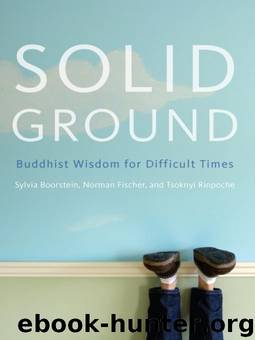Solid Ground by Sylvia Boorstein

Author:Sylvia Boorstein
Language: eng
Format: epub
Publisher: Parallax Press
Published: 2011-03-20T16:00:00+00:00
Finding Space
Of course, when we do decide to incorporate meditation practice in our lives, we need to rely on a method—some technique of focusing the mind, allowing it to come to rest, opening it to accept certain thoughts, feelings, and sensations—and cultivate compassion. While methods are important, we must be careful not to become so attached to them that we hold on to them as if we are too tightly hugging a little puppy. Methods are subject to the influence of causes and conditions.
Say, for example, we’ve found through practice that a certain technique like mindfulness of breathing or mindfulness of physical sensations creates an experience of calmness and stability. Then one day, we sit down to practice and we just can’t find that peace, that calmness. Maybe a strong thought or emotion or a painful physical sensation keeps intruding on our awareness. Maybe the television or stereo is playing too loudly in the next room, or street noises penetrate even a closed window. It’s so easy to become frustrated when such conditions arise—to tell ourselves that the method doesn’t work, that meditation doesn’t work, that our mind (or our body) just isn’t up to the challenge.
Of course, one way to deal with this situation is to switch methods. Instead of mindfulness meditation, for example, maybe we can try tonglen or some other practice. We don’t have to stick to a particular method just because it has worked in the past.
The bigger issue, though, is that we’ve become attached to the results of our practice. We like the peace so much; we like the sense of stability or calmness we’ve experienced and so we’re disappointed when the results we’ve come to expect don’t occur. But if we attend to our reactions, we gradually come to see that our practice has become colored by hope and fear, by pleasure and displeasure, by expectations—and that’s not such a bad thing to notice.
The frustration we experience is an opportunity to discover within ourselves a deeper sense of freedom by allowing some space into our practice. Whatever comes up while we practice—whether it’s a thought, a feeling, or a physical sensation—we just let it come up. We don’t need to suppress it; but we don’t need to follow it, either. We can simply welcome it and observe it as part of the process of being alive, right here and now. We can say, in effect, “Hello! I’m a little bit busy right now, so I can’t pay much attention to you, but feel free to hang around. Feel free to come and go as you please.”
That space is a form of love. It’s a form of appreciation of our basic humanity. I think it’s wonderful that we have so many thoughts, so many sensations, and so many emotions. They are all human gifts. Without them, we would be like rocks.
The difficulty most of us face is that we’re afraid of our humanity. We don’t know how to give our humanity space. We don’t know how to give it love.
Download
This site does not store any files on its server. We only index and link to content provided by other sites. Please contact the content providers to delete copyright contents if any and email us, we'll remove relevant links or contents immediately.
The Four Agreements by Don Miguel Ruiz(6745)
Flow by Mihaly Csikszentmihalyi(4689)
The Four Tendencies by Gretchen Rubin(4595)
Adulting by Kelly Williams Brown(4567)
You Do You by Sarah Knight(4464)
The Hacking of the American Mind by Robert H. Lustig(4375)
Ikigai by Héctor García & Francesc Miralles(4248)
Right Here, Right Now by Georgia Beers(4198)
A Simplified Life by Emily Ley(4158)
The Art of Happiness by The Dalai Lama(4125)
The Power of Positive Thinking by Norman Vincent Peale(4062)
The Little Book of Hygge by Meik Wiking(3687)
The French Women Don't Get Fat Cookbook by Mireille Guiliano(3659)
The Heroin Diaries by Nikki Sixx(3543)
The Courage to Be Disliked by Ichiro Kishimi & Fumitake Koga(3489)
The Choice by Edith Eva Eger(3467)
Why Buddhism is True by Robert Wright(3447)
Spark Joy by Marie Kondo(3299)
Make Your Bed by William H. Mcraven(3176)
